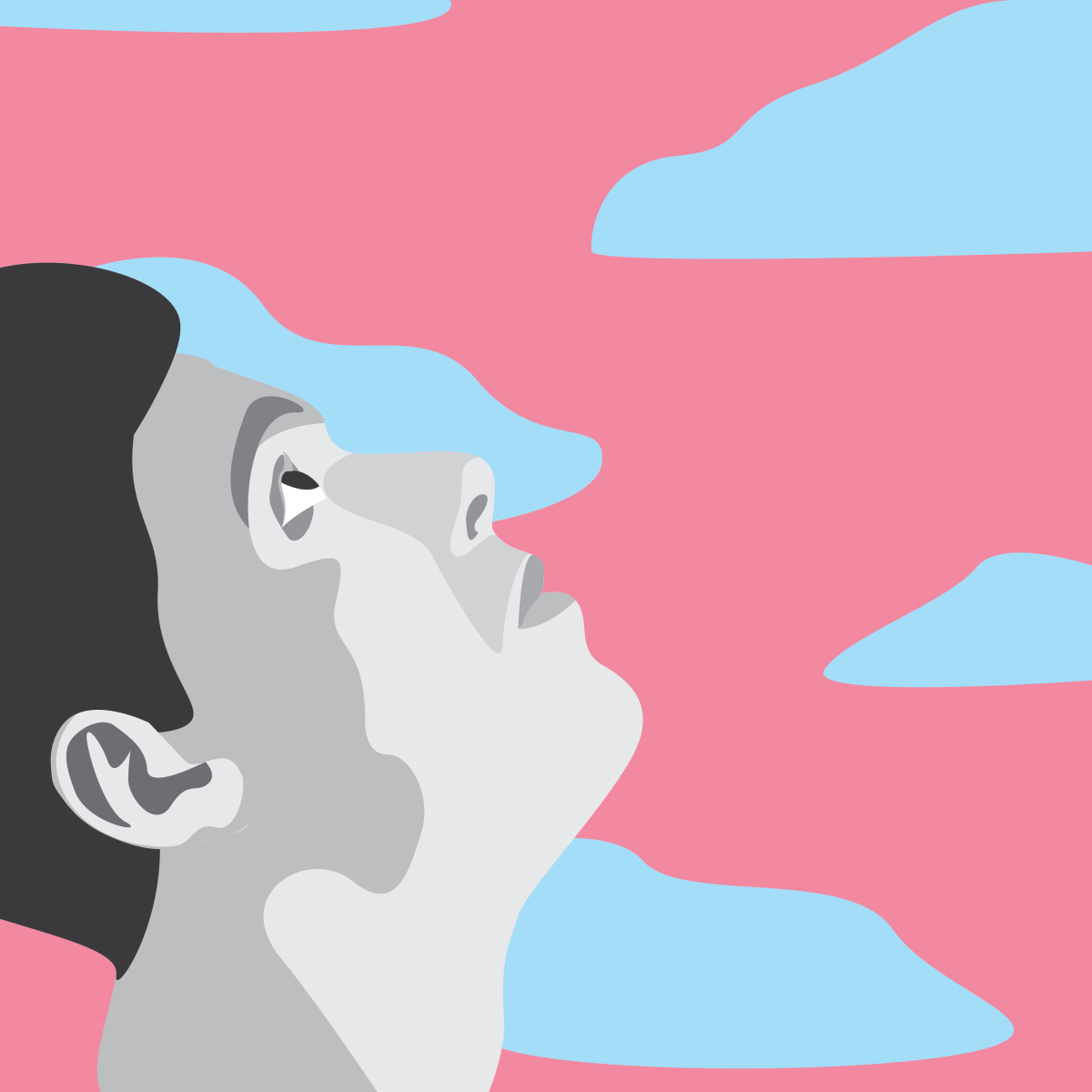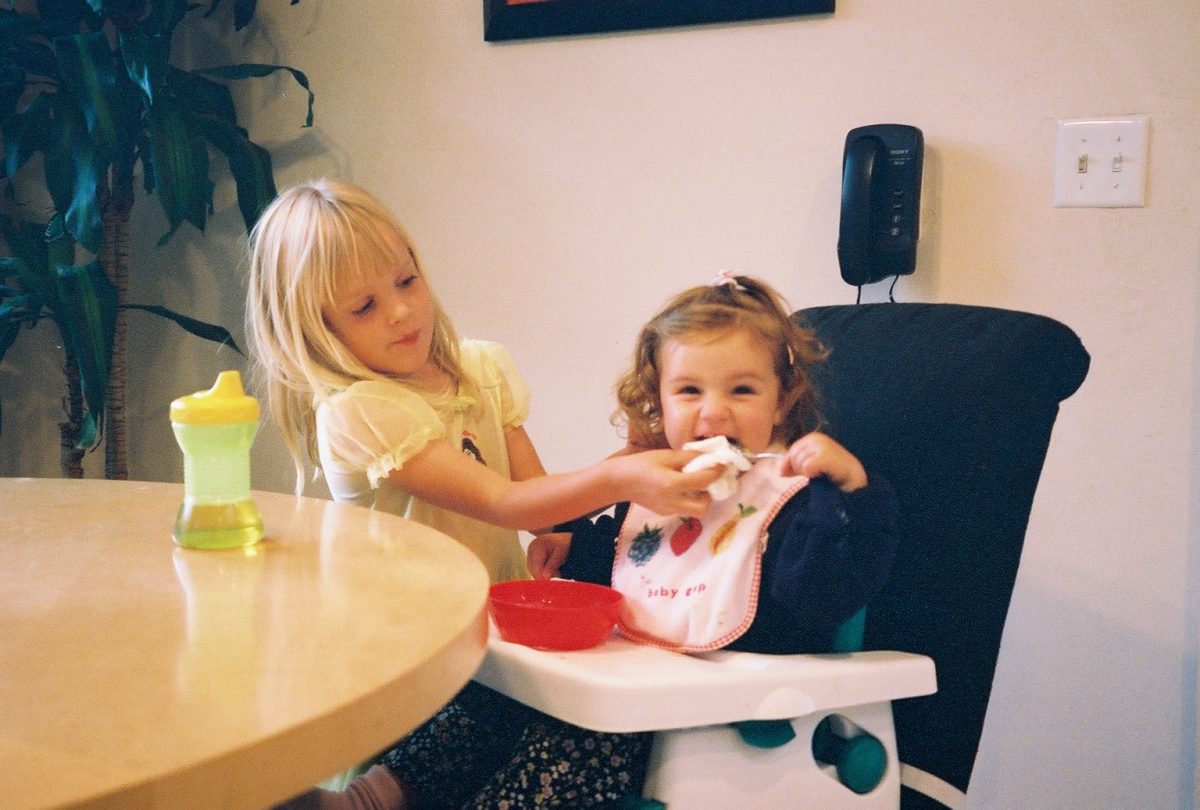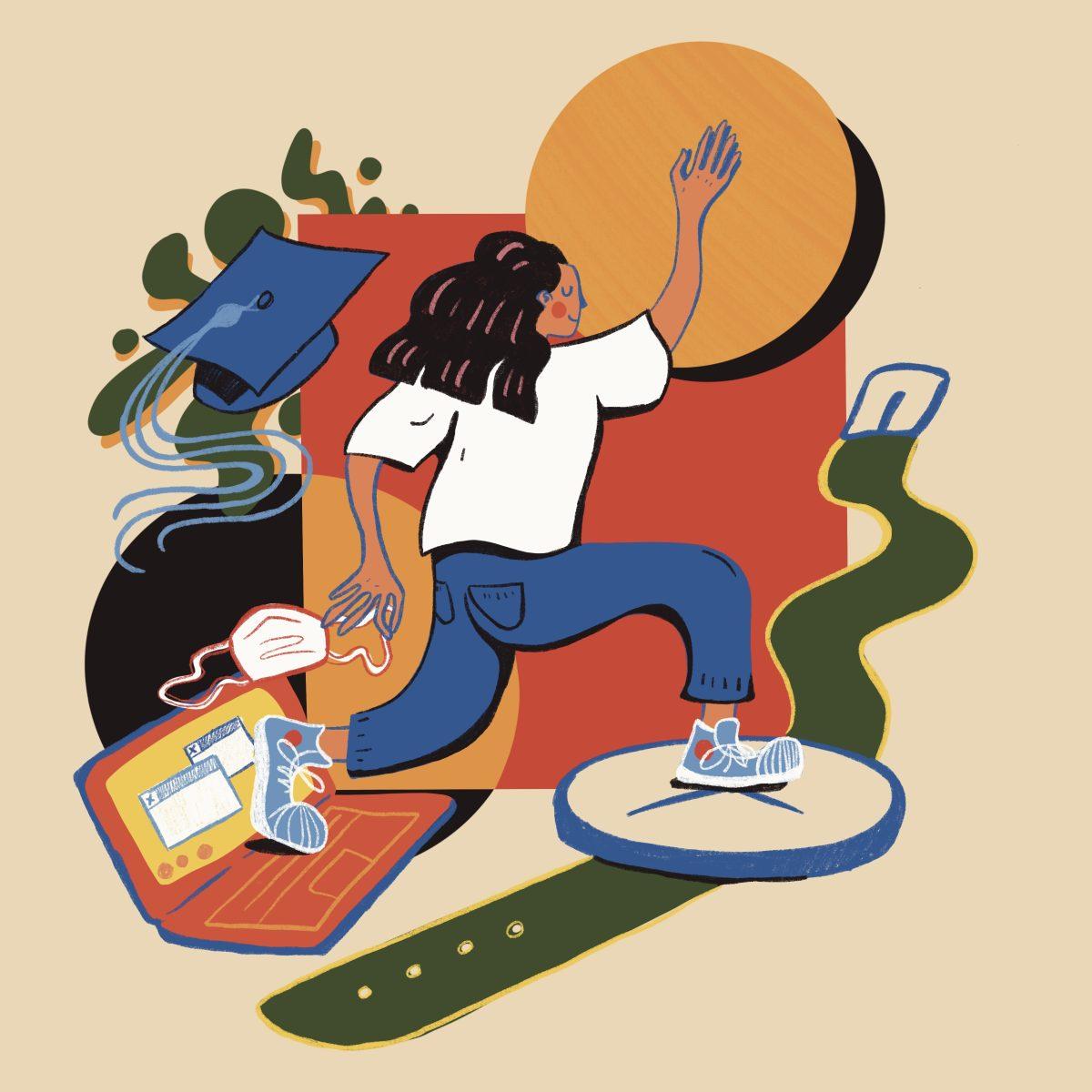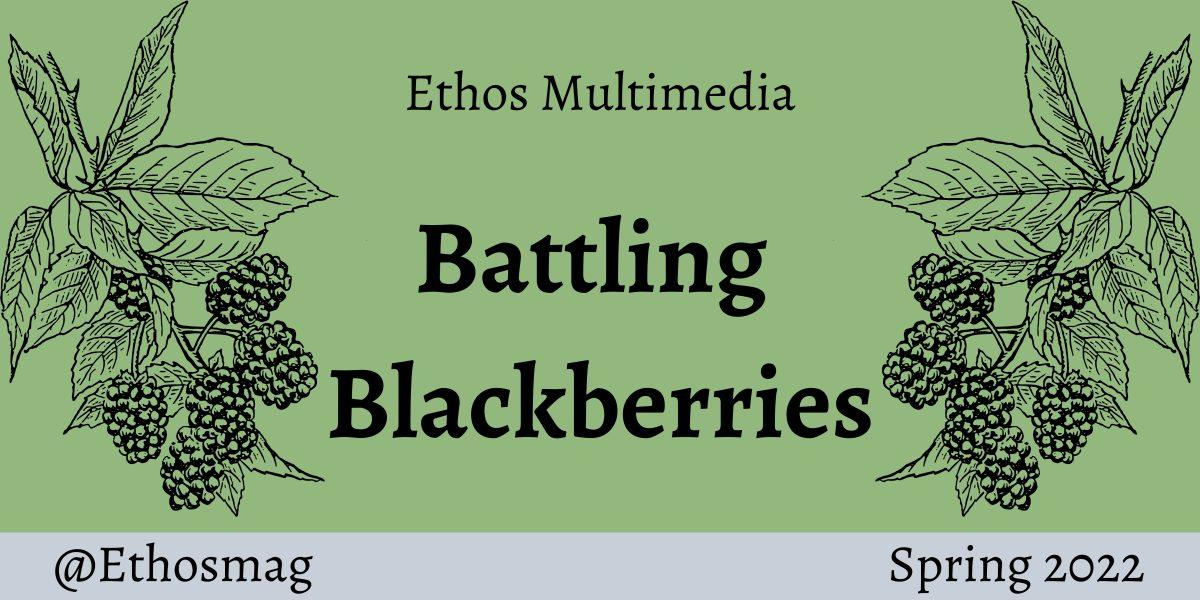“My mental health stuff kind of started in high school, but if you asked someone who knew me then, that would not be something that they would ever think of. I was very, very — on paper — successful,” Caela explains as she toys with her long chestnut hair. It’s Sunday morning and she’s waiting for her laundry to finish while we chat.
Caela Fenton is a PhD student who specializes in North American contemporary literature and ecocriticism at the University of Oregon. She moved here from Toronto almost two years ago, and we’ve been roommates ever since. She’s an avid runner, a beer pong champion and a formidable academic.
Her eyes somberly glance back and forth between me and the wall as we speak. She explains, “It was sort of like ‘well you have everything, and therefore you should not be feeling… not great.’ But I started having some pretty bad panic attacks in grade twelve. I’d had some problems before then with disordered eating, and then I was also fainting a lot. Any time I got stressed or worried, I would think I was going to faint. Then I would panic. It just became this really, really terrible cycle. My parents thought there was something biomedical going on. I had a bunch of brain scans and seizure tests.
Caela begins telling a story about having a severe panic attack while on a run with a boyfriend in high school. She recounts the day in close detail: “This was probably in the throes of me really not eating enough… I told my boyfriend I was sore and I needed to cut out early. I made it all the way home and he left. Then I full-on had to lie on the floor and just not move for two hours.” She places a hand on her chest to emphasize her next point: “I actually thought I was having a heart attack. I was like, ‘oh god I need to be going to the hospital.’ Yet I still sent him home.’”
Here, Caela pauses somberly before continuing. In a gloomy tone she admits, “For me that was when I realized — wow, this is a problem. This was someone I was very close to and who knew about the fact that I wasn’t just the bright and shiny exterior. But still, I just really, really didn’t want to admit that I was having these panic attacks.”
She proceeds to explain more about her transition from high school to university, where she was a competitive runner until an injury to her hip flexor ended a promising career. After the injury, she says she kept putting on a performance of wellness despite her intense feelings of loss and isolation. Caela wonders aloud if that performance ever really ended: “Fake it till you make it is a slippery slope. Sometimes it becomes ‘okay, I’m just pretending to be fine all the time.’ You just get up and go out and put your game face on… But I guess the lines have just become blurred now, and I don’t even know when I’m faking it anymore.”
Here, Caela suddenly bursts out laughing:
“That’s dark, that’s really dark.”
—
Fake it till you make it, right?
Academia, despite making broad claims to caring about students’ mental health, is rarely willing to back up that lip service with material support. Even if you have a documented mental illness, emotional impairment, or disability, there are precious few resources that the university will offer you.
If you’re one of the silent sufferers with a high-functioning mental illness that allows you to “pass” in work environments, your struggles are even less likely to be recognized. The assumption seems to be that if you can generally manage getting your work done, your mental health cannot truly be that bad. If things were really that bad, you wouldn’t be capable of functioning at all.
But this narrative leaves a lot out.
Celeste Reeb, an advanced doctoral candidate in sound and film studies, is another student whose personal life seems incomprehensible in light of her professional success. Celeste’s vibrant personality and equally-vibrant trademark style make her stand out from the traditional academic crowd. At work, she’s known for exciting panel presentations and impressive scholarly publications; in the community, she’s known for imaginative burlesque performances and hosting bingo nights.
But behind the scenes, she suffers from personal struggles that are too-often rendered invisible by her cheerful public persona.
“It’s usually the agoraphobia and the self-harm that a lot of people are most weirded out by in the sense that they don’t believe me,” she explains as we sit in her office in the Prince Lucien Campbell basement of Prince Lucien Campbell. Celeste’s desk is decorated with a Halloween-themed fabric cover, a few plastic ravens on the shelf, and several festive Valentine’s Day cards pinned above her workspace. And books — lots of books. The room feels inviting, and so does her honest tone as she continues speaking:
“People have trouble processing it for multiple reasons. One, I seem extroverted so agoraphobia seems weird because they imagine a hermit. Because that’s what pop culture says it is. And also, with the self self-harm, they seem to think: well, I’m achieving things so why would I want to do this?”
“But every day of my life I think about it. Some days it’s just a passive ‘that’s a thing I could do’ or ‘that’s a thing that I sometimes do.’ And then some days it’s like, it’s going to take all of my energy not to do this today. So it’s either read this book that I need to read, or spend that same energy not destroying myself.”
Celeste suggests that her visible productivity on campus is less about her academic discipline, and more about having to rush to complete work she couldn’t manage at home. For this reason, the frequent compliments she receives on her work ethic can be disheartening: “I don’t inherently want to read two books today. But I don’t have a choice because yesterday was spent making sure I don’t hurt myself.”
I glance at the daunting stack of books on her desk at this very moment, and think about my own first impressions of her. Last year, I’d been eager to imagine Celeste as having it all together. She seemed so obviously well-liked and successful. I point this out to her, and she laughs.
“Well, in an academic sense, I’ve figured out how to perform here. And it is a lot of performance. I’m loud and I’m confident and I’m fat. I take up a lot of space, so people don’t pay attention to the way that this is still a performance for me. But when I go to the grocery store and have a panic attack, I’ll just sit in my car and cry and dig my nails into the steering wheel. And it feels like I’m going to die there. It feels like there’s no way I will ever leave the car. The idea of getting out of my car and taking those ten steps to my front door seems so undoable that, in my mind, I now live and die in this car. Just because I’ve gone to a grocery store.”
Celeste pauses here to think. After a moment she adds, “I’ve probably gone to the grocery store after having taught a class, lesson planned, done my own work, and done some potential service on campus. But then I go home and I just completely fall apart. And this idea of the public performance just totally obscuring who the person is at home — I just feel like I’ve come up against it a lot.”
Despite the fact that she considers herself to be “somebody who tries to be very transparent about their chaos,” Celeste believes that normative narratives of mental health tend to water down the severity of this issue, even when people are actually talking about it. With some distaste in her voice, she summarizes this discourse: “Well, they can’t be that depressed if they’re still performing. If they were that depressed, they wouldn’t be here.”
—
Popular conceptualizations of mental illness fail to understand that many people who have experienced long-term mental illness or trauma are often highly-skilled at “passing” in public spaces. We might think about emotional resilience — the ability to adapt to stressful situations — as a kind of muscle that grows stronger the more it is used. In other words, if life is constantly throwing crisis after crisis at you, you’re more likely to think about this stress as a “normal” emotional baseline. As a result, you might be more experienced with acting “normally” in public even when you’re suffering.
On the other hand, if students have rarely experienced emotional turmoil in their lives, they’re less likely to have developed high levels of emotional resilience. The protective environment of youth, which keeps incidents of emotional distress to a minimum, lasts for a disproportionate amount of time depending upon one’s class, gender, sexuality, and race. Temporary environmental stress over bad grades or school deadlines might therefore exhibit itself quite visibly in some students, while long-term emotional suffering remains undetectable in others.
This normalization of emotional and mental distress begins early in life for some people because the protective bubble of youth “may not exist at all for others whose families do not have the wherewithal or resources to protect them from adult responsibilities or the consequences of taking them on so early in life.”
For many disadvantaged people who are constantly plagued by poverty, racism, and other violences, illnesses like depression and anxiety are just another fact of life. Under those conditions, the regularized suppression of pain isn’t always considered a mental health issue.
It’s more like a survival mechanism.
As a first-generation student from a poor background, Celeste recognizes this as a particularly salient factor in her own life. She explains, “I’ve been dealing with this my entire life, in multiple extremes — like being institutionalized for attempted suicide, or dealing with self-harm, or going through my mom’s mental illness. But that’s not everybody’s life. When people ask me how to deal with this, they’re often like ‘wow you know a lot’ and I just think to myself… I seem like I’m great at this because I’ve been dealing with it my entire life, and it’s new for you.”
She gives a good-natured laugh and then continues: “Everybody’s at their own spot in their depressive journey… But I do wonder if the knowledge I have access to in terms of anxiety, depression, and panic attacks just gets lumped in with this general sense of ‘Celeste just knows a lot of stuff.’”
Her reflections on the chaos of her earlier life are especially poignant when we understand that emotional resilience as also dependent upon, in part, one’s sense of social security. Having well-developed social skills and access to stable, supportive family (or surrogate family) members unarguably improves one’s ability to handle setbacks. However, those with traumatic relationship or familial histories tend to struggle with forming healthy social attachments, and instead develop anxious-preoccupied, dismissive-avoidant, or fearful-avoidant attachment styles. These insecure attachment styles can contribute greatly to long-term emotional stress, social distrust, and self-isolation.
Perhaps more than any other single factor, the psychological effects of isolation are most devastating. Even if students have no problem forming healthy social attachments, they might find themselves unable to locate other people they can comfortably identify with in homogenous, elitist academic settings. This is especially true for those coming from underrepresented backgrounds — including students like Austin Willhoft, a senior in journalism who identifies as having a “very mixed ethnicity” consisting of Taiwanese, Japanese, Hawaiian, and German ancestry.
As we talk over coffee in a crowded Starbucks before class one morning, Austin describes himself as a young man torn between two worlds and never able to fully exist in either: “Visibility-wise, every day it’s a struggle. I have white people that still say I’m not American fully. I have Taiwanese people saying I’m not Taiwanese fully, even though I have dual citizenship. Starting from when I moved here when I was five or six, there was always this feeling of being questioned. People seem to look at me and think ‘he’s not really a part of this.’ There’s a huge assumption of otherness. And again, it’s not like it only happens here. I go back to east Asia — Hong Kong, Taiwan, China, mostly places that have this Chinese diaspora — and people still look down upon me.”
Austin uses sweeping hand gestures to punctuate his thoughts as he speaks. He describes having immigrated to the US from Taiwan as a child, and then growing up with single immigrant mother after his parents divorced. At one point, he sighs and says, “I had to mature at a really early age. I had to really grow up. So coming to college, I’m not at the same level first in maturity, and then there’s my culture clash with other individuals. Sometimes it feels like there’s no reciprocation at all. I don’t think many Americans even realize how one-sided the cultural exchange is.”
We talk for a while longer about his childhood and adolescence, which he spent bouncing from group to group without ever really feeling at home. “I never had a group. I think it’s because I’m mixed,” he says. “I’m just — I come from all these different influences. People don’t see stuff through my eyes. I find it very rare that people can really understand my experiences. I used to try so hard to assimilate just so I could go to school and have something to talk about with other people.”
Austin goes on to tell a story about having to intervene when one of his mother’s employers refused to pay her. He highlights this as an example of racism’s invisibility, especially in the Asian-American community: “I’m not trying to complain. I would say as Asian Americans, you’re just taught not to say anything. Right? You suppress, you don’t say anything. There’s bigger problems out here. You don’t want to make a scene. You don’t want any issues.”
But trying not to complain, in Austin’s case, seems to result in not being able to talk about his identity at all. After talking about the way that his year abroad in Taiwan as a junior impacted his sense of self, he admits: “Coming back, it really cemented this feeling that I didn’t fit in. For most immigrants, you have this idea that America is such a great country. You come here and you expect people to be compassionate to you, in a sense. To have open arms. You hear that America is a land of immigrants. But I’ve always perceived that it’s harder for us. Life is just harder. It’s not a piece of cake. You have to fight every day. And sometimes fighting is gonna take a toll on you.”
—
Unfortunately, continuously performing wellness regardless of the emotional toll seems to be the only option many students have when it comes to the ivory tower. There’s a persistent unwillingness on the part of universities to actually accommodate the inconvenient reality of mental illness, even as its presence on campus grows.
Last year, Time magazine reported statistics from one survey of 63,000 students at 92 colleges which found that “nearly 40% of college students said they had felt so depressed in the prior year that it was difficult for them to function, and 61% of students said they had ‘felt overwhelming anxiety’ in the same time period.” For graduate students, these rates are even higher. In one study cited by Inside Higher Ed, researchers found that grad students were six times more likely than the general population to experience anxiety and depression.
However, it’s impossible to see evidence of these illnesses when everyone is constantly putting on a show. The performance of wellness not only makes everyday pain less visible, but also exacerbates sufferers’ feelings of isolation, uncertainty, and confusion.
John Fernelius, a first-year master’s student, notes that his perception of other students as well-adjusted makes him feel even more alone in his struggles: “There’s a real pressure for some students to maintain an appearance or façade that everything is okay. You don’t want to show cracks in the armor, so to speak. Everybody puts on such a show of having everything together and being hard-working. I feel like nobody thinks that they really belong here, but nobody is willing to show that either.”
As he pauses to think, John leans back a bit in his chair. He adjusts his glasses while I stir my chai tea and wait for him to continue. Espresso Roma isn’t too busy this afternoon, so we are able to talk freely.
Eventually, he says, “I see people higher up in the program who, at least on the outside, seem to have it all together. And I just think to myself — oh shit, I’m never gonna be like that. Never that focused and that secure. And that makes me less likely to reveal any doubts. It reminds me of, if you’ve ever been depressed or anxious or something, when people just told you ‘well stop being depressed.’ That sentiment gets translated to an academic and professional context of ‘power through it.’ You don’t have time or the right to stumble. You need to just keep going.”
When I ask him if he would ever feel comfortable actually citing mental health in requesting an accommodation from a professor, he balks: “No, no. I think if there were — I would have to phrase things very carefully. Like I think I’ve asked for an extension once and I framed it really vaguely. I would never feel comfortable asking for accomodations. That’s admitting too much weakness, sort of thing. You gotta feel out the professors too, figure out who’s gonna be empathetic. But that’s hard because it’s a professional relationship.”
John’s fear of asking for accommodations might be well-justified if Caela’s experience with doing so is any indication. She describes the disheartening response she received after speaking with a faculty member about a particularly difficult term: “They don’t really have anything in place to help you. She was sort of like, well if you have to take a term off, we would understand. And I was like, woah, that seems like a big step from me saying I think I need a little bit of help — straight to being like, well you should take a term off. Especially as an international student, that’s not really an option because there’s all sorts of problems with my visa.”
The other students I spoke to agreed with John and Caela that, for all intents and purposes, mental illness can be a major professional liability. Need an extra day to do an assignment because you had a panic attack? Unprofessional. Need to miss a class because you can’t get out of your house? Unprofessional. Need to unplug for a weekend so you can recover? Unprofessional.
Celeste also points out that this subtle kind of elitism compounds other systemic inequalities because what qualifies as “professional” is gendered, racialized, and classed. She argues, “I think that the idea that mental illness is unprofessional is a big issue. But then again, a lot of the things that I am are unprofessional. Fat is unprofessional. Queer is unprofessional. The cornerstones of my identity are unprofessional.”
—
Many students, especially graduate students, worry about the long-term reality of coping with mental illness in high pressure academic environments. Celeste speculated about whether professors, too, were trapped by a continuous performance of wellness. In the same vein of thought, Caela also wondered if the expectation to perform perfectly would ever decrease: “I’ve worried more this term than any other term about like — oh, is this how it is for the rest of forever? Because I’m not sure I can do forty years of this kind of environment and mentality. That’s like a scary thought for someone who has, for years, wanted to be a professor. That’s my dream job.”
Still, despite there being little hope for change at the institutional level, students trudge on. At the very least, most of us have at least one or two people in our personal lives we can lean on. Celeste recounts how hard her partner works to emotionally support her, and John sings the praises of both his therapist and his friends. And, after Caela and I finish talking, I hug her and thank her for sharing things that I hadn’t known about her, even after living together for two years.
These dialogues between friends and loved ones matter. But the conversation about mental health and the performance of wellness needs to be much, much bigger. It needs to be so big that everyone gets space to talk.
In quiet offices and busy coffee shops, we can work together create some of this space — little protective bubbles where we can be seen and heard.
Austin tells me about one of those spaces as our hour-long conversation winds down. “Have you ever heard of International Community of Voices?” he asks. I nod my head no, and he quickly launches into an explanation: “They’re a mental health support group that gears services specifically to international students… [Fei Shen, the group’s founder] basically recognized that as a Chinese individual, as a student, that international students will not open up unless they have that relation to you. They need to see a face that they get, right? It’s totally about trust. But International Community of Voices has been very undocumented because there’s no official university mental health group gearing its services to international students. That’s a real lack in the university. Most universities don’t get that. They want to allocate the money somewhere else. But right now I think we’re kind of experiencing this kind of identity zeitgeist.”
He shrugs half-heartedly — a fatigued acquiescence of reality — but then concludes somewhat optimistically:
“I think something like that is a start. It’s better than it not being there. At the end of the day, there’s been more people that have been opening up.”








![[Photo Courtesy of the Lara Family]
Ruben embraces his beloved childhood goat, Katrina.](https://ethos.dailyemerald.com/wp-content/uploads/2025/05/katrina-1-1060x1200.jpg)





